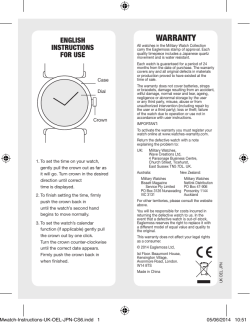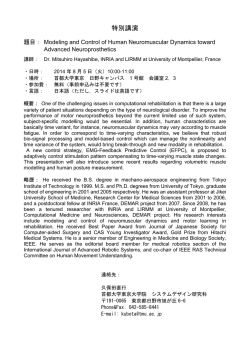
Lesson 14 - Meister Press
Lesson 14 Vocabulary (2007 年 センター追試) 1 問1 From a commercial point of 1 look 2 ④ sale 3 sense ① view 問3 food, clothing, and shelter. 1 for 2 from 3 to 4 with 問4 The flowers on the table were so beautiful. When I touched them, however, I 問3 found they were ① artificial 2 1 . superficial 3 unnatural 4 Hiroshi didn t describe what happened in ① 1 Let s 問5 1 2 ③ moment 3 number 2 ③ don t go to 3 not go place 人工的な 2 superficial 表面の,うわべの 3 unnatural 不自然な 4 untrue 事実に反する,うその イディオム 1 in detail 詳細に 2 in a moment すぐに 3 in number 数の上では 4 in place 適当な所に,適した □「∼しましょう」:( ) Let s ∼ □「∼すべきだったのに」:( ) should have + 過去分詞 □ warn:「∼に警告する,忠告する」 4 not to go to me when I warned you. 1 be listened 2 be listening 3 have listned 4 listen 156 高3 センターテキスト②(問題).indd 156-157 4 artificial anywhere tonight. There s a good movie on television. not go to You should 問6 問6 detail 1 □「∼するのをやめましょう」:( ) Let s not ∼ ; he only told me the most important facts. 語彙(形容詞) □ describe:「∼の状況を説明する」 untrue 問5 問4 □「B を A に頼る」:( ) depend on A for B □ in addition to ∼: 「∼に加えて」 □ shelter:「住居」 4 In addition to love, children depend on their parents 問2 □「∼の観点からすると」:( ) from a ∼ point of view □ commercial:「商業的な」 □ failure:「失敗」 問2 , this film is a failure. Grammar ( ) from a ∼ viewpoint 次の問い(問 1 ∼ 10)の に入れるのに最も適当なものを,それぞれ下の 1 ∼ 4 のうちから一つずつ選びなさい。 問1 & 157 © Meister Press 2014/10/18 13:23 Lesson 14 ① Things long 問7 1 enjoyed 2 Do you mind 問8 cannot be forgotten. ④ enjoying 3 Vocabulary have enjoyed 4 to enjoy me to get to call 2 me to make a phone call 3 my getting to call 4 my making a phone call ② He had to make his article a little shorter space in the newsletter. 1 because limited 2 due to lack of 3 in need 4 instead of In Japan 問 10 ③ school. 1 almost 1 blue ones Point ① mind を使った表現 mind を使った表現 あなたは(あなたが)∼するのを気にしますか 1 Do you mind ∼ ing? 2 Do you mind my ∼ ing? ∼してくれませんか あなたは私が∼するのを気にしますか ∼してもよろしいですか イディオム 1 due to ∼ ∼のせいで,∼が原因で 2 lack of ∼ ∼の不足 3 in need 困っている,助けを必要としている 4 instead of ∼ ∼の代わりに □ make O + C:「O を C にする」 □ article:「記事」 □ newsletter:「会報」 2 almost of 3 most Susie has got some yellow socks, but I ve got 問 11 □「∼される A」:( ) A + 過去分詞 Point ② □「電話をする」:( ) make a phone call 問9 people go on to senior high school after finishing junior high Grammar □「∼している A」:( ) A ∼ ing 問8 here? 1 問9 問7 & 2 blue them 3 4 ① ones blue most of . 4 them blue 問 10 「ほとんど」 × almost of ∼ ∼のほとんど ○ any of ∼ ∼のあらゆるもの ○ most of the ∼ ∼のほとんど ○ almost all of the ∼ ∼のほとんどすべて ○ most + 名 ほとんどの∼ □ senior high school:「高校」 (a)+ 形 + one (s) 問 11 □「(繰り返しを避けて)∼なもの」:( ) □ socks:「ソックス」 158 高3 センターテキスト②(問題).indd 158-159 159 © Meister Press 2014/10/18 13:23 Lesson 14 Reading 読解演習 (2013 年 センター追試) apartment that has a similar arrangement to the one in her parent s house. In 25 次の英文を読んで,あとの問いに答えなさい。文章の左にある⑴∼⑹は段落の番号を表す。 ⑴ this case, she enters a new scene that is like one she has previously encountered. Chikako has arrived in Australia for the first time to study English. Her host Even though none of the individual elements is familiar, she has experienced an family picks her up from the airport and takes her to their home. When she steps arrangement very similar to this one ̶ a lamp in the corner, a picture on the back through the front door, she has a strong feeling that she has been in the house wall, a couch in the middle of the room. Thus, the second explanation suggests that before. She sees a white couch against a sky-blue wall and a glass coffee table 5 ⑵ if we are in a place where the arrangement of objects is similar to that of a place we 30 covered with magazines in front of the couch. She cannot remember when she saw have been to before, we might have a feeling of knowing the place and call it déjà this scene, but she believes that this is not the first time. vu. The feeling that Chikako has is called déjà vu, which is French for already seen, ⑸ and most of us have experienced it at some point in our lives. Some people choose to a particular part of the brain through different pathways. The data from these ⑶ investigating déjà vu, and more than thirty possible theories have been offered to but sometimes there is a slight delay in one of the pathways. As a result, the brain explain the phenomenon. Of these theories, three promising explanations will be interprets one experience as two and a déjà vu feeling occurs. 40 ⑹ experience can be explained by one of the three theories or a combination of them. when we have unconsciously seen something a moment earlier. For example, Learning about déjà vu can help us understand how we perceive the material world suppose a man enters a museum for the first time, and a giant dinosaur in the center around us, and that, in turn, can reveal more about how our brains handle routine staircase on his left, which he only sees unconsciously because his attention is on the dinosaur. A few minutes later, when he decides to go and see other exhibitions, his 問4 Three promising explanations of déjà vu have been presented here. Chikako s The first explanation for déjà vu is that we have a strong feeling of familiarity of the main exhibition area draws his attention. There is also a jungle-patterned 20 pathways normally reach the destination at the same time to form a whole image, 問1 reviewed here. 15 The last explanation for déjà vu has come from studies about how the brain of information in the brain. When something is seen, the visual information is sent 35 Déjà vu, however, is not uncommon and has been the subject of scientific studies since the 19th century. Many researchers today are starting to see the value in 問3 functions. These studies have shown that it can be caused by unusual processing to ignore it because the feeling of recalling a new experience seems unnatural. 10 In another situation, a woman first sees the living room of a friend s new ⑷ 問5 information. Although we know more about déjà vu now, questions still remain. 問2 45 For example, why does it occur frequently during everyday activities? Why does it decrease with age? It will be interesting to seek the answers to these questions. eyes directly catch the staircase. At this moment, he is struck by an unexpected sense that he has seen the same staircase before but cannot remember when and he announces his strange déjà vu experience to his life. 160 高3 センターテキスト②(問題).indd 160-161 161 © Meister Press 2014/10/18 13:23 Lesson 14 A 次の問い(問 1 ∼ 5)の に入れるのに最も適当なものを,それぞれ下の 1 ∼ 4 のうちから一つずつ選びなさい。ただし,解答の根拠となる部分(本文)に下線を引くこと。 that 根拠となる部分は 1 箇所とは限らない。 Paragraph ⑵ implies that 問1 ② According to the explanation in paragraph ⑸ , the studies of the brain show 問4 . ① can cause déjà vu. 1 a delay in the processing of information 2 data delivered through different pathways 1 déjà vu is a lot more common in France 3 processing different information at the same time 2 déjà vu is considered a worthy topic for study 4 sending whole images to the destination 3 more studies will be done to stop people feeling déjà vu 4 people who have déjà vu tend to think about their own lives The author argues that 問5 The man in paragraph ⑶ felt déjà vu because he 問2 ① . ② . 1 Chikako s déjà vu experience doesn t fit any of the explanations 2 déjà vu can show how the brain processes the things we see 1 had seen an object without knowing it 3 research on déjà vu can help people learn how to avoid it 2 previously paid close attention to an object 4 too little is known about déjà vu for scientific investigation 3 saw an object that looked like one of his own belongings 4 saw an unexpected object in a familiar place According to paragraph ⑷ , déjà vu can occur in a room where 問3 1 the furniture is similar in color to your own 2 the layout is familiar to you 3 there are items you have seen before 4 you have been before 162 高3 センターテキスト②(問題).indd 162-163 ② . 163 © Meister Press 2014/10/18 13:23 Lesson 14 B 次の表は,本文の段落と内容をまとめたものである。表の に入れるのに最も適 Note 当なものを,それぞれ下の 1 ∼ 5 のうちから一つずつ選び,表を完成させなさい。ただし, 同じものを繰り返し選んではいけません。 Paragraph Content ⑴ ② ⑵ An Introduction of déjà vu ⑶ ③ ⑷ ⑤ ⑸ ① ⑹ ④ 1 A biological reason for déjà vu 2 A déjà vu experience 3 Being unaware of things in our vision 4 Contributions of déjà vu research 5 Déjà vu and the placement of objects 164 高3 センターテキスト②(問題).indd 164-165 165 © Meister Press 2014/10/18 13:23
© Copyright 2026


